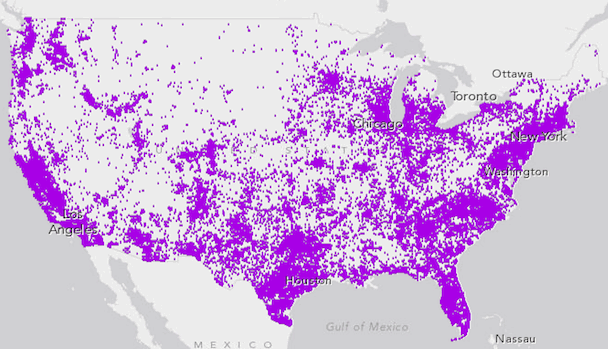
Map of people that speak Spanish at home. Source: Badger, Emily, “Where 60 Million People in the U.S. Don’t Speak English at Home,” The Atlantic Cities
According to the Census Bureau, about 20% of people speak a language other than English at home. That’s 1 in 5 people! And over the years, this number has only grown. The Census Bureau has developed a map that shows in which parts of the country these people live. What the map shows is that there are people whose preferred language is not English in all but the most sparsely populated parts of the country. Language access is a civil right, and these rights are reflected in federal law. It is also becoming more common to see instructions on packages, advertisements, and other messages translated into languages other than English, as well. When it comes to language access, the policies of the United States promote inclusion.
Despite these efforts at inclusion, accessing many government programs poses unique challenges for older adults with limited English speaking ability. Programs like Medicare Part D (the prescription medication program) and the Affordable Care Act’s health exchanges rely on consumers to choose the plans that will balance value and health coverage. However, there are multiple studies from the implementation of Medicare Part D that state consumers do not choose the most economically efficient options. Most people, particularly those who prefer to speak in a language other than English, could benefit from learning more about their health care options.
These challenges are not limited to programs as complex as health insurance, however. Hispanics in Philanthropy found that Hispanic older adults across the United States struggle to access Older Americans Act resources that are available in their community. Older adults with limited English speaking ability oftentimes cannot easily access basic services like benefit counseling, transportation, and home delivered meals. In theory, these programs should not be difficult to access; many Older Americans Act programs do not require any registration or paperwork and are available to anyone over 60 years of age. In practice however, diverse older adults across the country have a hard time accessing them.
The Diverse Elders Coalition (DEC) is working to strengthen these policies and ensure that they fulfill their potential of providing meaningful language access. The DEC will work to educate diverse communities about the opportunities presented by the Affordable Care Act and help connect them to health exchanges. Stay tuned! The DEC is also advocating for policies to modernize the Older Americans Act by making sure that communities prioritize the provision of services in a culturally and linguistically competent manner.

